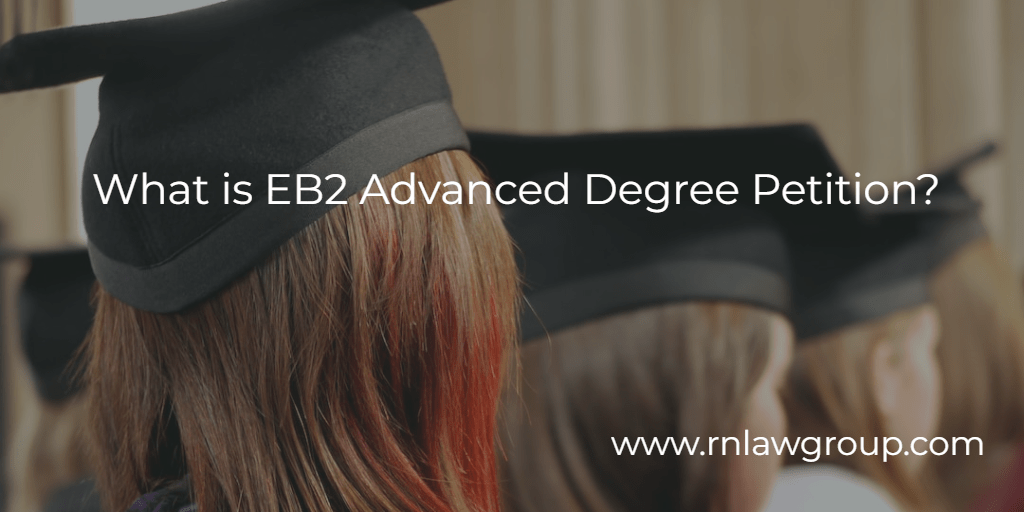
What is EB2 Advanced Degree Petition?
An employer in the United States seeking to hire a foreign national with an advanced degree, may be able to sponsor them for permanent residency through the Employment-Based Second Preference (EB2) visa category. This category is specifically designed for professionals holding advanced degrees or individuals with exceptional ability in their field. This article will discuss the EB2 Advanced Degree Petition, including its eligibility requirements, the application process, and some helpful tips for a successful application.
What is an Advanced Degree?
An advanced degree is any academic or professional degree earned in the United States or abroad that is higher than a baccalaureate. The equivalent of a master’s degree is a bachelor’s degree from the United States or a foreign country plus five years of progressive work experience in the field. The petitioner must also either have received a job offer from a U.S. employer or qualify for a “national interest waiver”, in which case they may self-sponsor.
In most circumstances, the U.S. employer giving the employment must seek labor certification before a foreign citizen can apply for an EB-2 green card. Individuals who are eligible for a “national interest waiver” of the labor certification requirement are exempt from this rule.
The U.S. Department of Labor’s (DOL) labor certification confirms that the company has conducted a sufficient employment search and has correctly concluded that there are no competent American workers available for the position and that hiring a foreign national won’t have a negative impact on the salaries and working conditions of American workers, necessitating the employer’s use of foreign labor. The beneficiary’s suitability for the position and possession of the required training, expertise, and experience to carry out its responsibilities must also be proven by the employer.
Acceptable documentation includes
An official academic record showing you have a U.S. advanced degree (or a foreign equivalent degree); or
An official academic record showing you have a U.S. bachelor’s degree (or a foreign equivalent degree) and letters from current or former employers showing you have at least five years of progressive work experience in your field after you earned your bachelor’s degree.
The “progressive” aspect of the experience requires that throughout the course of the five years, the worker’s level of responsibility, the complexity of the activities they undertook, and the knowledge they acquired in that role all had to advance.
Application Process for EB2 Advanced Degree Petition
The EB-2 green card requires employer sponsorship, much like the majority of employment-based visas do. You can only self-sponsor if you are eligible for a National Interest Waiver. The U.S. employer will start the application process by submitting a PERM Labor Certification application to the Department of Labor (DOL) on Form ETA 9089 and later file the I-140 petition to the United States Citizenship and Immigration Services (USCIS) along with original PERM Certification and other supporting documents. Upon approval of I-140 Petition, you can choose to submit an adjustment of status petition to the USCIS if you are in the United States legally as a nonimmigrant. If you are outside the United States, you will need to process your immigrant visa at the U.S. embassy or consulate in your country of residence. As part of the application process, your employer must be able to demonstrate an ability to pay the offered wage as of the priority date and continuing until you obtain lawful permanent residence status.
Employers should present as much proof as they can to show that the beneficiary satisfies the eligibility standards in order to maximize the likelihood that an EB2 Advanced Degree Petition will be approved. Academic transcripts, professional licenses, job letters, and recommendation letters are a few examples of this. Also, employers should make sure that all necessary documents are attached to the forms and that all information is accurate and complete. Any missing or incomplete information can delay the processing of the petition or result in a denial.
Furthermore, it is crucial to work with a skilled immigration lawyer who can assist you with the application process and offer professional guidance on how to present your case in the best possible light.
You can pay an extra cost for premium processing to shorten the length of time it takes to process your EB2/ NIW petition to just 15 business days. Although it won’t raise your chances of being accepted, it might shorten the amount of time you have to wait for a response.
Reddy Neumann Brown PC has been serving the business community for over 25 years and is Houston’s largest immigration law firm focused solely on US. employment-based immigration. We work with both employers and their employees, helping them navigate the immigration process quickly and cost-effectively.
By: Hari Subhash
Hari Subhash is a staff attorney at Reddy Neumann Brown PC He works in the H-1B Department where he assists clients through all phases of the non-immigrant visa process.
Attorney Hari is a law graduate of the University of Pune. He subsequently received his LL.M from the University of Arizona, James E Rogers School of Law. He has over 10 years of experience as a lawyer in civil suits, labor and employment law, family law, personal injury, and ADR proceedings in India. During 2018 – 2022, he volunteered at Bankruptcy Assistance Center, Washington DC. Since 2019, he has been working as an attorney in the areas of immigration, bankruptcy, and personal injury in the United States. As an immigrant himself, he hopes to continue to play a role in helping individuals to start their journey in the United States lawfully and all it offers.

